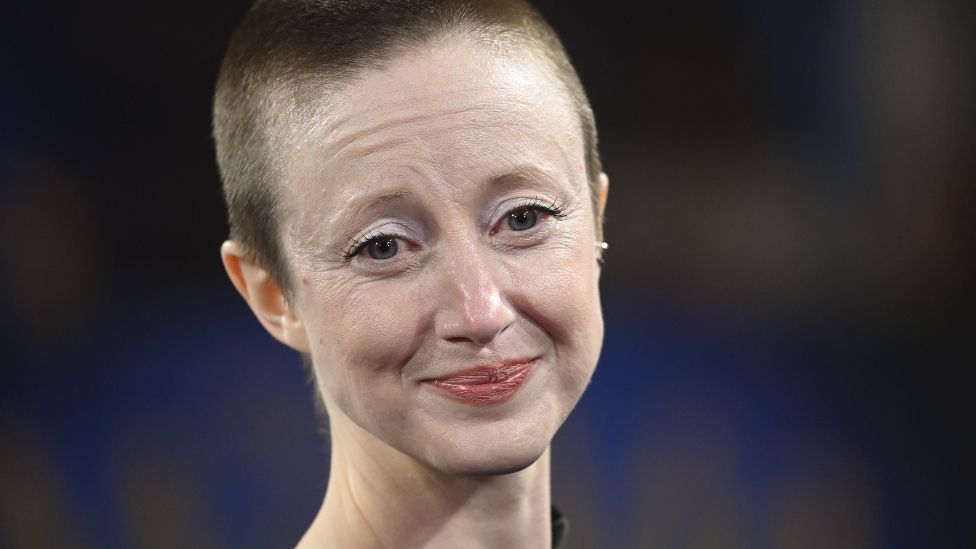ARTICLE AD BOX
 Image source, Getty Images
Image source, Getty Images
Newcastle-born actress Andrea Riseborough is nominated for best actress for her performance in To Leslie
By Steven McIntosh
Entertainment reporter
A surprise Oscar nomination scored by British actress Andrea Riseborough has prompted debate in Hollywood. But did an apparently grassroots campaign which championed her break any rules?
Many awards watchers were stunned when Riseborough was nominated last week for best actress for her performance in To Leslie. Not because she was undeserving (quite the opposite), but because of how unusual the nod was for someone who had practically no previous awards season momentum.
A-listers including Gwyneth Paltrow, Edward Norton and Courteney Cox were among those who had tried to drum up support in the dying days of Oscar voting for Riseborough, who plays an alcoholic mother who squanders her lottery winnings in the critically praised but little-known To Leslie.
Despite the stars' efforts ultimately being successful, questions have been raised about how Riseborough's nomination was achieved, and whether some of those campaigning for her broke any Academy rules.
The Academy Board of Governors has indicated the issue will be part of the agenda at their next meeting on Tuesday (31 January), after the awards body was reportedly inundated with calls and e-mails regarding the actress's inclusion.
Image source, Reuters
Image caption,Actors Riz Ahmed and Allison Williams announced the 2023 Oscar nominations last week
In a statement on Friday, the Academy said their goal to ensure was the awards competition is "conducted in a fair and ethical manner". The body said it wanted to "ensure that no guidelines were violated" and examine "whether changes to the guidelines may be needed in a new era of social media and digital communication".
The issue of whether Academy rules were broken by some of those advocating for Riseborough comes down to a few specific posts which not only championed her, but also made reference to her competitors - something which is strictly forbidden.
The Academy's official rules state that any forms of public communication by anyone directly associated with an eligible film which "attempt to cast a negative or derogatory light on a competing film or achievement" will not be tolerated.
"In particular," the add, "any tactic that singles out 'the competition' by name or title is expressly forbidden", and punishable by a one-year suspension of membership for first-time offenders.
One since-deleted Instagram post which has particularly come under the spotlight was published by the official To Leslie account.
It quoted Richard Roeper of the Chicago Sun-Times, who wrote: "As much as I admired [Cate] Blanchett's work in Tár, my favourite performance by a woman this year was delivered by the chameleonlike Andrea Riseborough."
Image source, Reuters
Image caption,Some posts contrasted Riseborough's performance with her competitor Cate Blanchett's - which goes against Academy rules
While there was no wrongdoing on the critic's part for expressing his opinion, it's possible there was wrongdoing on the To Leslie campaign's part for choosing to quote a journalist who contrasted Riseborough's campaign with Blanchett.
Similarly, actress Frances Fisher, who has appeared in Titanic and Gone In 60 Seconds, was one of those who named fellow best actress contenders such as Blanchett and Michelle Yeoh while posting her support for Riseborough.
(Ironically, Blanchett herself was one of the stars who praised Riseborough - alongside other fellow actresses - during her acceptance speech at the recent Critics' Choice Awards.)
These apparent rule breaches could well have been made innocently. It's unlikely that all Academy members and film PR teams are aware of every single Oscars campaigning rule.
Regardless, it is unlikely that Riseborough will be disqualified from the best actress race. It is not impossible, however. Oscar nominations have been rescinded before, albeit never in an acting category.
Lobbying is historically one of the most common rule breaches. While promoting and advertising yourself or your film is permitted, personally contacting Academy voters by telephone is not.
Which other nominations have been withdrawn?
Image source, Getty Images
Here are three of the most recent examples of Oscar nominations being revoked:
Something which could be more likely is some form of mild punishment for anybody who breached Academy guidelines by pushing for Riseborough.
The Academy may also release a statement after their meeting on Tuesday reiterating what the rules are, or potentially even tightening them.
Most industry pundits agree that Riseborough gives a strong and memorable performance in To Leslie, but worry that her best actress nomination came at the expense of black actresses.
Image source, Getty Images
Image caption,Danielle Deadwyler, pictured with co-star Jalyn Hall, was widely expected to be nominated for her performance in Till
Viola Davis was thought to be in the running for her performance in The Woman King. But the omission of Danielle Deadwyler, who gives an outstanding performance in Till - a film about the 1955 lynching of 14-year-old Emmett Till in Mississippi - was hardest thing to stomach for many.
Till director Chinonye Chukwu accused the Academy of "unabashed misogyny towards Black women", while awards watchers expressed dismay that Deadwyler had been overlooked.
But even if Riseborough's nomination was revoked, that doesn't necessarily mean Deadwyler or another actress would take her slot. In most previous cases of nomination removal, the category shrinks to four contenders instead of adding a new fifth contender.
It's worth remembering that many pundits were delighted to see Riseborough nominated and were more put out by the nods for Ana de Armas, whose film Blonde was largely disliked, and Michelle Williams, who some felt was taking a slot in the leading actress race when her character in the Fabelmans was arguably a supporting role.
Ultimately, of course, it is the 10,000 Academy voters who bear the responsibility for nominations rather than Riseborough herself or any of the other contenders.
Image source, Getty Images
Image caption,Marina de Tavira (pictured right with Roma co-star Yalitza Aparicio) scored a shock supporting actress nomination in 2019
Riseborough's nomination was highly unusual primarily because she had not shown up at any of the precursor ceremonies, except the Independent Spirit Awards, which specifically champions indie films.
Perhaps one of the closest comparisons to Riseborough is Roma star Marina de Tavira, who pundits think is the only previous actor to get an Oscar nod without a single precursor nomination.
There are other comparisons to be made. In 2004, a print advertising campaign was launched for Shohreh Aghdashloo's performance in House of Sand and Fog. Three of the advertisements referred to Renée Zellweger (who eventually won for her performance in Cold Mountain), quoting critics who said they preferred Aghdashloo's performance to hers.
Bruce Davis, the Academy executive director at the time, called it an "attack ad", and the film studio's bosses subsequently issued apologies, saying they had made "a very bad and ill-advised mistake".
The possibility of Riseborough's nomination being withdrawn, however, was met with scepticism from film critics on social media. The announcement of Tuesday's meeting quickly became a meme, with many pundits joking that the Academy was now also reviewing other previous perceived Oscar snubs.
Some media outlets have a vested interest in stirring up tension about Riseborough's nomination. Many showbiz publications make millions of dollars every year from the more traditional campaign methods - namely film studios paying for print or online advertisements.
Meanwhile, many have come to Riseborough's defence. Wednesday star Christina Ricci said: "Seems hilarious that the 'surprise nomination' (meaning tons of money wasn't spent to position this actress) of a legitimately brilliant performance is being met with an investigation.
"So it's only the films and actors that can afford the campaigns that deserve recognition? Feels elitist and exclusive and frankly very backward to me. If it's taken away, shame on them."

 1 year ago
20
1 year ago
20








 English (US)
English (US)